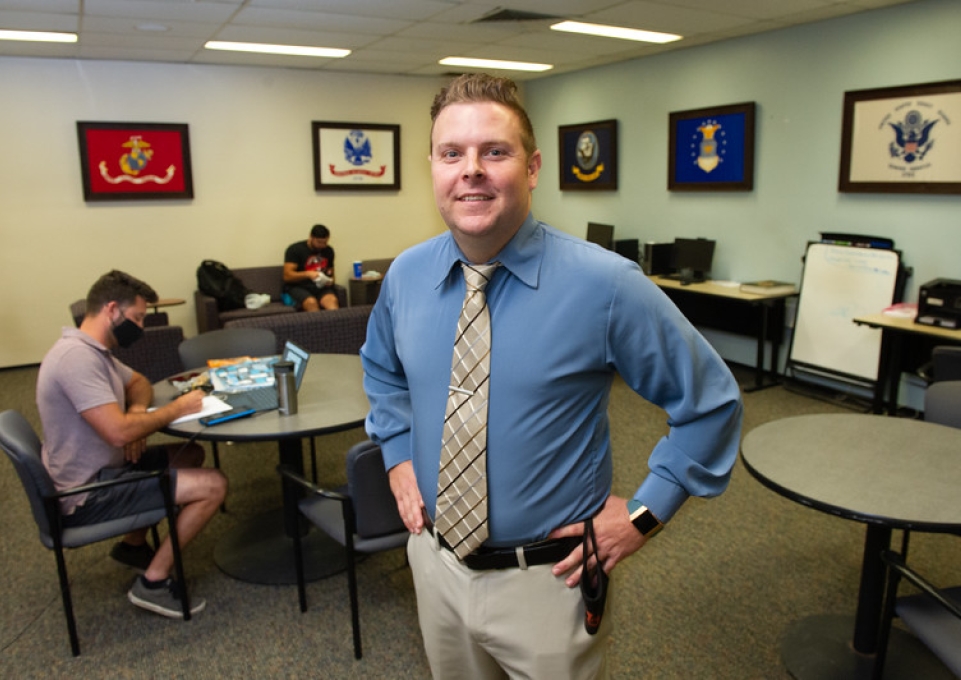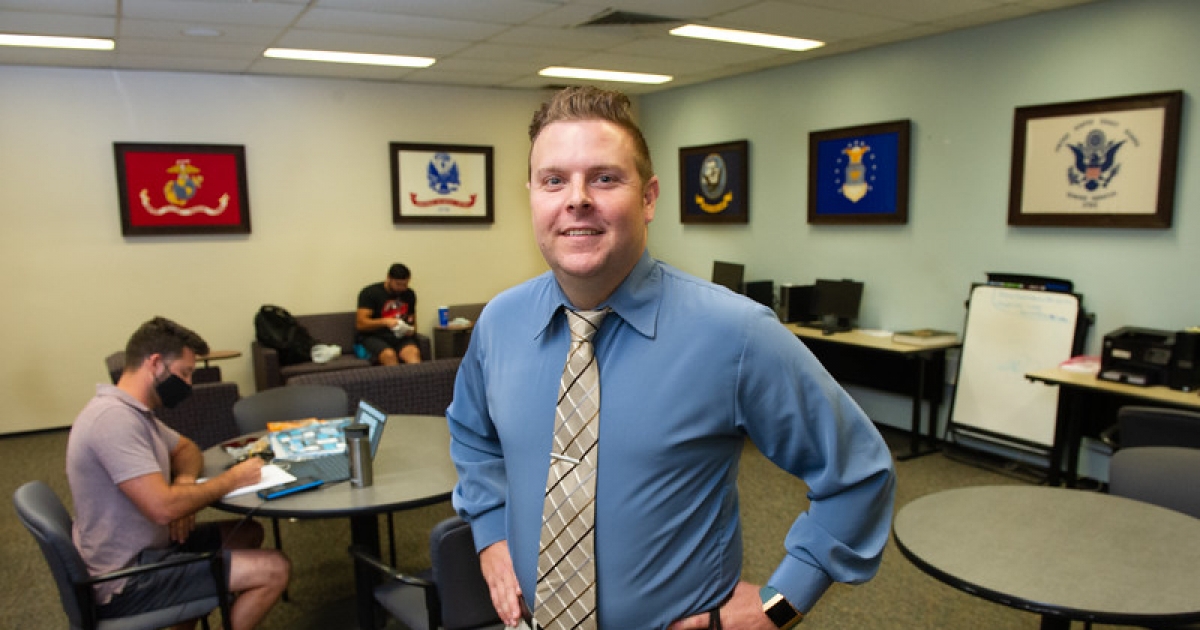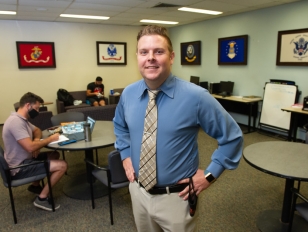
Michael Avery, a senior electrical engineering technology: smart grid major at Buffalo State College, works 15 to 20 hours a week in the Veteran and Military Services office. He primarily talks with military and veteran-aligned students about the benefits they should receive and directs them to the right individuals on campus who can help them solve any problems they may encounter. He said it’s been a meaningful job where he’s gained worthwhile experience.
“I’ve liked having the opportunity to explore new experiences, such as taking a weekend retreat to Beaver Hollow with the group and public speaking in front of incoming students at Military Student Orientation,” said Avery, a Grand Island, New York, native who enrolled at Buffalo State in 2018 after a four-year stint in the U.S. Army.
Avery is one of nine work-study students that Brad Baumgardner, coordinator of veteran services, has hired this year to handle everything from ensuring that the Veteran and Military Services Student Lounge is stacked with beverages and snacks to serving as a liaison to the campus mentorship program. The latter is a program that helps new students get acclimated to the college environment by assigning a senior military student to help them with any questions or concerns they have as they start their first semester.
“I didn’t know what to expect from this job because the program was brand-new when I signed up,” Avery said. “But I’ve found it has allowed me to better incorporate myself into the college lifestyle after leaving the Army.”
Increasing student connections and moving the office from the first floor of Cleveland Hall to the fourth floor of the Campbell Student Union are just two of the changes taking place within Veteran and Military Services this year. Previously part of the Continuing Professional Studies Office, Veteran and Military Services moved under the Dean of Students Office July 1 and now falls under the leadership of assistant dean of inclusion and equity Michael Heflin.
Connections with students begin when they are accepted to the college—making sure they have the cost of attendance covered and connecting them with advisers, if necessary—and they extend to the months beyond graduation, with help finding employment.
“This realignment resulted from a study that involved student-veterans, staff members, and benchmarking with standards established for veteran-serving programs,” said Timothy Gordon, vice president for student affairs. “This change will continue to provide opportunities for Mr. Baumgardner and the Dean of Students area to engage with and support students who have served this country, address their needs, and continue to support their success.”
While Baumgardner said he enjoyed working with colleagues in Continuing Education, physically moving the office to an area where more students are present makes sense. The veterans student lounge also moved recently, from the first floor of the Student Union to the fourth floor, just down the hall from Baumgardner’s office.
“You could make the argument that working under Student Affairs supports best practices for connecting with students,” said Baumgardner, who served both active duty and in the U.S. Air Force Reserve and joined Buffalo State in 2016. “I’m looking forward to our office operating as part of a team and connecting more with other offices on campus.”
About 350 military-aligned students are enrolled at Buffalo State each semester. They include active-duty members, military reserves, ROTC cadets, and veterans as well as their dependents.
A big part of Baumgardner’s job is to ensure that these students get the financial benefits they are entitled to and understand the wealth of perks the college offers, including application fee waivers, a separate orientation, priority registration, free parking, support and referral resources, and tutorial assistance. Buffalo State has been consecutively ranked among the top military friendly schools in the country, placing No. 2 among public universities in 2018.
“The U.S. Department of Defense and the Veterans Administration are asking a lot more from college military offices, due to new regulations, including the 2017 Harry W. Colmery Veterans Educational Assistance Act, also known as the ‘Forever GI Bill,’” he said.
For Baumgardner, connections with students begin when they are accepted to the college by making sure they have the cost of attendance covered and connecting them with advisers, if necessary. And it extends to the months beyond graduation, when he works to help them find employment.
The new configuration—and the funding for the work-study students—provides an extra layer of support for students, he said.
“They’re helping me to create relationships and setting expectations for all the military-aligned students,” Baumgardner said. “The more people who know them on campus, the more they will be held accountable to go to class, follow through, and, ideally, graduate. There’s a lot of outreach within our office, so if a problem arises, we can address it.”
Pictured top: Brad Baumgardner, coordinator of veteran services, in the Veteran and Military Student Lounge on the fourth floor of the Campbell Student Union.
Photo by Bruce Fox, campus photographer.



